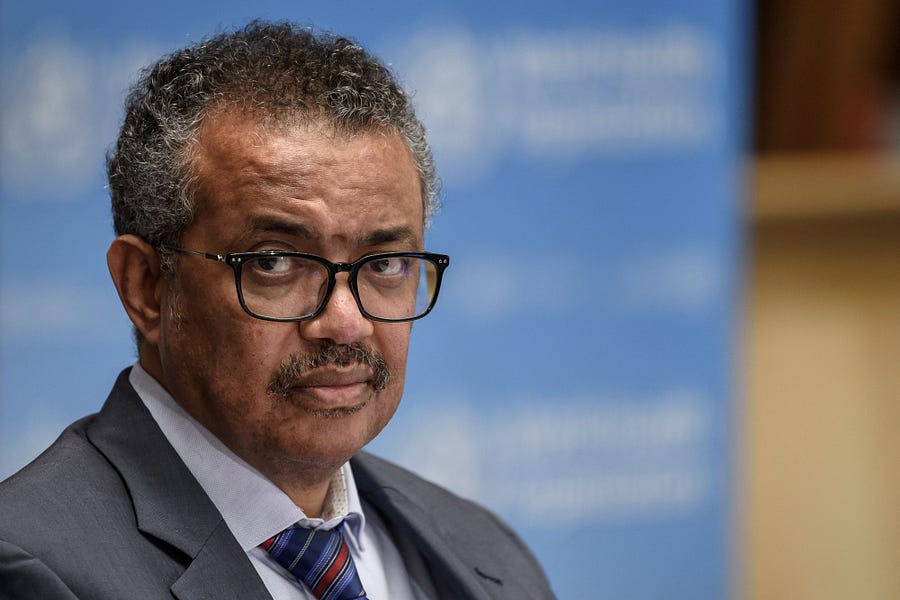In a global pandemic, an impartial, science-oriented, competently led, transnational health organization is vital. There is no better way to prevent, detect, and aid in coordinating a global response to infectious diseases that have pandemic potential. Millions of lives depend on it.
But an organization that is overly deferential to one nation — the People’s Republic of China, for example — is incapable of being an honest broker, and costs the very lives it is intended to save. That is why the United States withdrew from the World Health Organization, and why, with the right reforms, it can rejoin.
The WHO failed at its most critical moment. Pressure from Beijing led Director-General Tedros Adhanom Ghebreyesus to echo Chinese misrepresentations of the nature of the threat from COVID-19. Tedros also stifled alarms about Beijing delaying a visit by a WHO technical team, concealing vital details regarding transmission, and failing to share critical multigeneration virus samples.
Most recently, the WHO changed its timeline on COVID-19 to clarify that the organization first found out about the disease from online sources, not the Chinese government, as previously claimed. This raises questions about the accuracy of other WHO statements. Indeed, despite internal frustration at the WHO over Beijing’s lack of transparency and cooperation, Tedros praised China repeatedly out of fear that criticism could further undermine Beijing’s limited cooperation.
But laying blame for the WHO’s failures at the feet of Tedros, while in many ways deserved, inappropriately absolves the member states of the WHO. It is up to those member states to guarantee the organization’s adherence to global norms. It is their responsibility to mandate the steps the WHO must take to regain credibility and persuade Washington to return.
These steps are manifestly achievable, even logical. First, as the World Health Assembly (the decision-making body of the WHO) resolution on COVID-19 detailed, the WHO must complete an “impartial, independent and comprehensive evaluation” of the “WHO-coordinated international health response to covid-19.” In short: what happened, and how. Without this information, any reform effort will be proceeding blindly trying to prevent the next pandemic.
Another key will be to ensure that member states meet explicit standards, and be held accountable when they don’t. While binding International Health Regulations (IHR) can and must be strengthened, they are hamstrung by a lack of consequences when states ignore or violate them. If states fail to alert the WHO of potential pandemics, fail to share information as required, or fail to allow WHO expert teams timely access, then other states are justified in taking precautionary actions like travel restrictions. (And that, by the way, is the way we want it: member states taking responsibility, not WHO bureaucrats.)
If states fail to meet IHR standards, the WHO must be required to publicly share that information. Recommendations for periodic compliance reviews have been made before, most notably after the 2014 Ebola disaster, and summarily ignored.
Similarly, members must rethink the WHO budget. Right now, it allocates only 15 percent to- 20 percent of its resources to pandemic detection, prevention, and response. In response to COVID-19, the WHO had to solicit additional funding almost immediately. Surely it is obvious that a disease that can cause trillions in global losses and hundreds of thousands of deaths should be the primary focus on the organization, rather than one of many.
But the sine qua non for the continued functioning and credibility of the WHO must be its insulation from political pressure. How? Ironically, the organization already has within it the seeds of a solution — the Health Emergency Program (HEP), which is at the heart of the WHO’s pandemic response effort. The HEP is charged with helping governments improve their capacity to detect, prevent and respond to health emergencies; assessing the threat of infectious hazards; and helping coordinate a rapid and effective response to such hazards.
Slicing the HEP off the WHO bureaucracy as an independent steering group that would answer directly to the executive board of the WHO (a rotating group of elected nations that govern the organization) would ensure that it is not bottled up by bureaucratic concerns, but able to report directly to the member states who would be threatened by a pandemic. An independent pandemic alarm system would mean that neither the Chinese government (COVID-19) nor the West African states where Ebola devastated populations would be able to pressure WHO bureaucrats to delay declaring an emergency.
None of these solutions is in any way radical. None of them are biased against any particular nation. Indeed, in a normal world, it would be easy to build consensus around the imperative for a global health organization to respond rapidly and impartially to a crisis such as COVID-19. Brushing the failures of the WHO under the carpet is typical of international bureaucracies; and one of the few ways to refocus members and bureaucrats is by withholding cash and credibility. That it came to such a pass reflects far more on the collective members of the WHO and its staff, far less on those in the Trump White House that noticed WHO’s catastrophic early missteps.
Danielle Pletka is a senior fellow in foreign and defense policy studies at the American Enterprise Institute. Brett D. Schaefer is the Heritage Foundation’s Jay Kingham fellow in international regulatory affairs.
Photograph by Fabrice Coffrini/AFP/Getty Images.






Please note that we at The Dispatch hold ourselves, our work, and our commenters to a higher standard than other places on the internet. We welcome comments that foster genuine debate or discussion—including comments critical of us or our work—but responses that include ad hominem attacks on fellow Dispatch members or are intended to stoke fear and anger may be moderated.
With your membership, you only have the ability to comment on The Morning Dispatch articles. Consider upgrading to join the conversation everywhere.